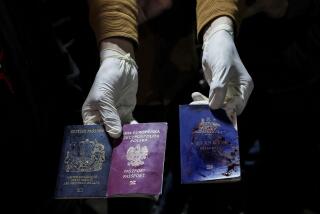Emotional Roller Coaster Ride Launched by Fragment of News : Families: Loved ones of a small-town reserve unit knew their relatives were near barracks hit by a Scud. For many hours, it was ‘pure hell’ of waiting.
- Share via
It took only minutes Monday afternoon for the horrifying news to flash through the neighboring communities of Farrell, Sharon and Wheatland on the Pennsylvania-Ohio border.
In Dhahran, Saudi Arabia--where 76 local men and women reservists belonging to Farrell’s 475th Quartermaster Group have been stationed for nearly five months--a stray Scud missile had destroyed a barracks.
On television, frightening bits of information from the scene began arriving slowly in Farrell, a steel town of 6,000. Pictures of a demolished building. Estimates of at least 12 deaths. Reports of many injured.
Then came the news the families of the reservists had been praying would never come: TV reports said the obliterated barracks apparently housed the 475th, an Army reserve headquarters unit based in Farrell that administers the distribution of fuel for warplanes and tanks.
By late Tuesday the Pentagon had not identified all those killed in the barracks nor their unit. However, members of the 475th were accounted for, and it appeared that Farrell’s reservists had been spared. But the hours in between were some that the town will never forget.
Sue Weiser is a bartender at the American Legion Post 432 in Wheatland, which borders Farrell. She said she went through “eight hours of pure hell” from the time she heard the news on television Monday until she learned that her son, James, 21, was uninjured.
James, a communications specialist with the 475th, called his fiancee at about 10 Monday night.
“He was very shook up,” Weiser said not long after the call. “He said: ‘You wouldn’t believe the sights I’ve seen tonig” She said he was sleeping in the barracks next to the leveled building where at least 28 died and 100 were injured.
When Josephine Ion, the coordinator of the 475th’s family support group, first turned on the television Monday and heard about the Scud attack, “Boom. It hit me like a ton of bricks. It made me physically ill,” she said.
Throughout the afternoon and into the next morning, Ion, 44, would field scores of telephone calls from newspapers and radio stations, anxious wives and near-hysterical mothers.
Believing that 12 men and women from the 475th were dead, she alerted a counselor and was dreading what each new newscast would bring.
Death was something the support group had discussed, she said, taking a deep breath and collapsing into a chair. “But I don’t know how these people are going to handle this. I’m so scared. People’s lives are so fragile.
“Not knowing and the waiting are the hardest parts. One of the toughest things we’ve had to deal with is that it comes across on CNN before we get any word. It’s tough on us,” she said Monday night.
“We’re confused, worried, trying to put up a good front for our kids. We don’t want to let them worry.”
Fortunately, word of her own husband’s fate came relatively early: Several soldiers who called worried wives from Saudi Arabia passed on the word that Ion’s husband, Master Sgt. Eugene Ion, 46, was unhurt.
Mrs. Ion hadn’t seen Gene since he and the 475th shipped out in early October, she said between phone calls in her cluttered kitchen.
On her kitchen table, a package containing venison sausage and hot peppers and other treats for her husband sat ready for mailing. The table top was heaped with lists of names and addresses, fat file folders, support group newsletters and other evidence of the months of tireless support work that had earned her the nickname, “Iron Lady.”
A photo album was full of snapshots sent from Saudi Arabia--Gene petting a camel, Gene posing like a tourist on a Persian Gulf beach, Gene playing Santa Claus for his unit.
A Christmas tree decorated only with yellow ribbons and lights sat in the corner of her living room, where she says it will stay until her Gene comes home. Her son Mike, 17, slept upstairs.
About 1 a.m Tuesday, the long wait was over. A friend called to tell her for certain that despite all the rumors and fears--no one from the 475th was dead or wounded beyond cuts and bruises.
It was unofficial. It was not from a military spokesman. But it was believable--Mary D’Urso’s husband, Antonio, called from Saudi Arabia to say that everyone from the 475th was alive. The Scud apparently hit a barracks next door.
At 1:55 a.m., a station on Mrs. Ion’s television set signed off with “America the Beautiful.”
Ion went to bed at 3, but a phone call disrupted her attempts to sleep--a mother with later word of a son. After a few hours of relative quiet, the stream of calls from mothers, wives, reporters, began anew.
At 8, Mrs. Ion--dressed in a “Desert Storm” sweat shirt and full of pep after less than two hours sleep--left for the red brick buildings of a nearby reserve center.
On her way out the door, she explained why she’s known as the Iron Lady.
“I can keep hold of my emotions until it’s all over. Then I collapse in private.”
More to Read
Sign up for Essential California
The most important California stories and recommendations in your inbox every morning.
You may occasionally receive promotional content from the Los Angeles Times.










